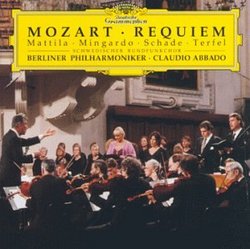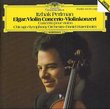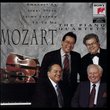| All Artists: Wolfgang Amadeus Mozart, Claudio Abbado, Karita Mattila, Sara Mingardo, Berliner Philharmoniker, Michael Schade, Bryn Terfel Title: Mozart - Requiem / Mattila, Mingardo, Schade, Terfel, Berlin Phil., Abbado Members Wishing: 0 Total Copies: 1 Label: Deutsche Grammophon Release Date: 10/12/1999 Genre: Classical Styles: Opera & Classical Vocal, Historical Periods, Classical (c.1770-1830), Early Music, Symphonies Number of Discs: 1 SwapaCD Credits: 1 UPC: 028946318126 |
Search - Wolfgang Amadeus Mozart, Claudio Abbado, Karita Mattila :: Mozart - Requiem / Mattila, Mingardo, Schade, Terfel, Berlin Phil., Abbado
 | Wolfgang Amadeus Mozart, Claudio Abbado, Karita Mattila Mozart - Requiem / Mattila, Mingardo, Schade, Terfel, Berlin Phil., Abbado Genre: Classical
Claudio Abbado's new recording of Mozart's great Requiem is something of a throwback to pre-enlightened ("pre-authentic"? "pre-original"?) performances of Mozart. The Berlin Philharmonic and Swedish Radio Chorus are big gr... more » ![header=[] body=[This CD is available to be requested as disc only.]](/images/attributes/disc.png?v=15401716) ![header=[] body=[This CD is available to be requested with the disc and back insert.]](/images/attributes/disc_back.png?v=15401716) ![header=[] body=[This CD is available to be requested with the disc and front insert.]](/images/attributes/disc_front.png?v=15401716) ![header=[] body=[This CD is available to be requested with the disc, front and back inserts.]](/images/attributes/disc_front_back.png?v=15401716) |
Larger Image |
CD DetailsSynopsis
Amazon.com Claudio Abbado's new recording of Mozart's great Requiem is something of a throwback to pre-enlightened ("pre-authentic"? "pre-original"?) performances of Mozart. The Berlin Philharmonic and Swedish Radio Chorus are big groups, and they play and sing with great beauty and warmth, but there's nothing of the "snap" we've become accustomed to. The whole affair sounds a bit leaden, if reverential. This has obviously been done on purpose--tempi and textures like these are not accidental, and clearly Abbado was after precisely this romantic approach. Whether you approve will be a matter of taste. His soloists are pretty good, with soprano Karita Mattila and bass-baritone Bryn Terfel being particularly fine. The two other selections are performed without much distinction. So? This isn't bad of its type, but why not stick with Colin Davis's reading of the Requiem? It's a real gem. --Robert Levine Similarly Requested CDs
|
CD ReviewsDisappointingly dull, lackluster Mozart E. Willinger | New York, NY USA | 10/18/1999 (2 out of 5 stars) "Could this be the same Abbado who just gave us on CD a wonderfully exciting, vibrant and expressive performance of Mahler's "Das Knaben Wunderhorn?" You'd never guess it from the enervated, plodding and listless versions of Mozart's Requiem and a couple of other sacred pieces here. The singing is adequate but not great or memorable, but it's the seemingly perfunctory conducting that deadens the entire disc. Go for Davis (especially), Marriner, Schreier or Gardiner if you want a spirited, gripping Mozart Requiem." Stunning Mozart, acoustically speaking M. B Hazen | Jacksonville, Fla. | 11/22/2002 (5 out of 5 stars) "Wow! KING.org Seattle radio played this recording as one of their top 98 classical requests. Personally, I own about 5 different recordings of the "Requiem", each for a different reason. I was listening to this, without knowledge of the performace, and was stunned by the spaciousness allotted to the familiar favorite. First of all, it's recorded in an acoustically wonderful space, with about a 7 or 8 second reverberation. With Abbado's tempos, precise and expansive orchestra, organ, excellent choir, and wonderful soloists, the whole package is a thrill. Of course, if you want to nit pick, you might say this wasn't the way Mozart would have wanted it, or it was much too grand for a sacred, intimate work such as Mozart's final gift to music. But, music is supposed to be a personal experience. If it is thrilling, that's actually OK. One doesn't have to justify a performance over another, just so it moves and is meaningful to you. This recording was akin to having Mozart's "Requiem" played at Yankee Stadium, but it was beautifully done. The only soloist on the disc I recognized and knew was Bryn Terfel. (I have a collection of his CDs. What a remarkable voice!!) But i really thrilled at the whole presentation via this DGG release of the Mozart "Requiem". As you read through the critiques by other music lovers, know within your own heart and experience, you will choose a perormance that is meaningful only to you! But as much of a "jaded" musician I am, and having sung this work many times, I would highly recommend this recording. That is, even if you know the work only from tidbits of it in the film "Amadeus", you will not be led astray by this one. It fills the room, and includes the heart! I felt as though I was listening on a cloud. Go for it!!" Abbado made it differently, yet very touching heavybug | Seattle, WA | 11/12/2003 (5 out of 5 stars) "Not many people favor this version of Mozart's requiem, they consider it "different, not traditional, and not detailed". They may be right, but the most important thing to me for a music piece, it's the ability to touch you right from the heart to the soul. And Claudio Abbado has achieved this in this recording. The speed Abaddo chose to play is faster than other conductors', even though the play time is short, the main theme was adequetely conveyed without putting too much attention to small details. Confutatis and lacrymosa are fatastic: The string gave a full powerful start with fast tempo, just like a storm has swept across the mind, followed with a soothing voice, comforting the struggling mind. But the mind is still confusing, so the fast tempo shows up again. The soothing voice appears again, the fear is fading, the mind is calming, and ready to sacrifice, and there comes lacrymosa.The chorus was superb, the orchestra has done their job without overpowering the chorus. When death is no longer painful and fearful, what else in the world to be worried about? Abbado did a wonderful job in showing us the spirit of Mozart's Requiem."
|

 Track Listings (16) - Disc #1
Track Listings (16) - Disc #1








